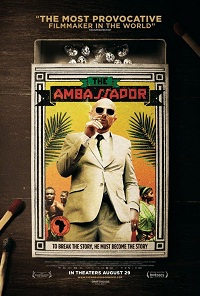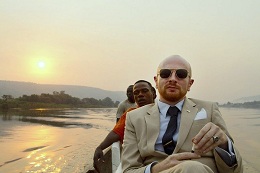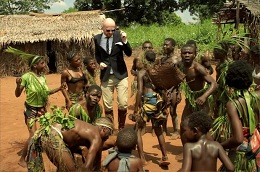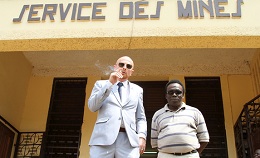 Imagine Sacha Baron Cohen crossed with Michael Moore and you’ll have a quick idea of what the new quasi-documentary The Ambassador is all about. Director and star Mads Brügger isn’t as funny a satirist or as skilled a storyteller as his forebearers, but his bold new filmmaking concept is as uncomfortable and sometimes as thrilling.
Imagine Sacha Baron Cohen crossed with Michael Moore and you’ll have a quick idea of what the new quasi-documentary The Ambassador is all about. Director and star Mads Brügger isn’t as funny a satirist or as skilled a storyteller as his forebearers, but his bold new filmmaking concept is as uncomfortable and sometimes as thrilling.
As Danish provocateur Brügger goes “undercover” in the Central African Republic to expose the network of people who enable the smuggling of blood diamonds, he exposes what political theorist Hannah Arendt famously called “the banality of evil.” So disgusting and amoral — and normal and everyday — is the behavior of men who support an illegal trade that enslaves people and funds dictatorships.
Still, The Ambassador is go-for-broke filmmaking and that has to be admired.
Confused yet? OK, here’s the setup:
 After he discovers shady brokers who deal in obtaining diplomatic credentials, Brügger buys one himself and heads to Africa as a Liberian consul who wants to build a match factory and teach the pygmys some useful skills. As new Liberian diplomat Cortzen, he is also very upfront about wanting to be involved in the conflict diamond trade, and does so. It is maddeningly easy when you have the right amount of money, it turns out.
After he discovers shady brokers who deal in obtaining diplomatic credentials, Brügger buys one himself and heads to Africa as a Liberian consul who wants to build a match factory and teach the pygmys some useful skills. As new Liberian diplomat Cortzen, he is also very upfront about wanting to be involved in the conflict diamond trade, and does so. It is maddeningly easy when you have the right amount of money, it turns out.
What makes this all so compelling? Well, using specially designed hidden cameras, Brügger films his “secret” meetings with these powerful men — ministers, defense secretaries, bureaucrats, other “diplomats” — who all put on this charade that they are doing things for the welfare of the country. The deeper he gets, the more dangerous the criminals he meets, and the less hidden their agendas become.
With his bald head, sunglasses, and cigarette holder, Brügger recalls gonzo journalist Hunter S. Thompson, who once went undercover with the Hell’s Angels. Brügger has similar intentions, and mostly he succeeds. If only he had Thompson’s way with words.
 What makes The Ambassador an uncomfortable marriage of muckraking journalism and almost-funny satire is that Brügger stays in character as Liberian diplomat Mads Cortzen the entire time. The narration never gives us a reprieve from the “joke” and we never hear him express regret or shame for his actions when the act goes too far and causes pain to those who are “innocents” — those not indicted in his exposé.
What makes The Ambassador an uncomfortable marriage of muckraking journalism and almost-funny satire is that Brügger stays in character as Liberian diplomat Mads Cortzen the entire time. The narration never gives us a reprieve from the “joke” and we never hear him express regret or shame for his actions when the act goes too far and causes pain to those who are “innocents” — those not indicted in his exposé.
Many times — like the moment he dances around with dirt-poor pygmy children who have been liquored up for the sake of his visit — he crosses the blurry line of reality-based satire. Scenes like this aren’t funny because they wouldn’t be happening had he not put those wheels in motion for the sake of a “joke.” And the time when he plays whale songs for two pygmys just to get close-ups of the bewilderment on their faces … was that supposed to be funny?
 Although The Ambassador could use a little more context and some genuine laughs to go with the commentary (you mean he couldn’t film multiple takes until he got the best one?), it still functions as a fascinating and troubling peek into a world seldom glimpsed by cameras.
Although The Ambassador could use a little more context and some genuine laughs to go with the commentary (you mean he couldn’t film multiple takes until he got the best one?), it still functions as a fascinating and troubling peek into a world seldom glimpsed by cameras.
Since the film has been released, the Liberian government has been up in arms that Brügger bought credentials under false pretenses to engage in illegal activities. And its true. He bribed officials and bought blackmarket diamonds. With their assistance. Hmmmmm … I’m thinking they don’t have much of a leg to stand on.
It’s ironic, considering that if even only half of what Brügger discovers in The Ambassador is true (there are some pretty amazing shots and multi-angle angles that just couldn’t have been hidden cameras), the attention brought to the entire affair might actually justify the means.








Comments on this entry are closed.